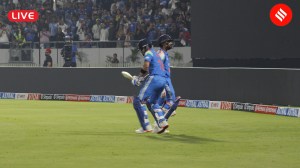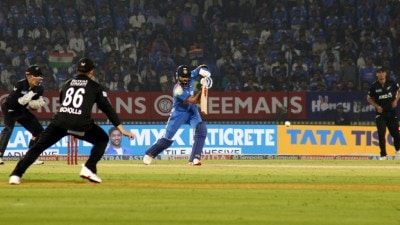Stay updated with the latest - Click here to follow us on Instagram
Animated Conversations
Defined by its edgy sketches,disproportionate figures with elongated facial features,animes (Japanese animation) popularity in the West has been immortalised in pop culture by the success of the TV cartoon series,Pokemon.
A first festival of Japanese animation films aims to popularise the anime tradition in the Capital
Defined by its edgy sketches,disproportionate figures with elongated facial features,animes (Japanese animation) popularity in the West has been immortalised in pop culture by the success of the TV cartoon series,Pokemon. But in India,its impact is rarely seen in the cultural landscape. Now a cinephile society,Cine Darbaar,in association with the Japan Foundation and Directorate of Film Festivals is attempting to bring awareness about Japanese pop culture. A three-day festival on anime films,comprising related elements like Manga comics,a photo-exhibition,Japanese music and talks exploring the parallels between Western animation and anime will be held at Delhis Siri Fort auditorium between August 20-22.
We wanted to attempt a festival on the lines of the Comic-Con international festival for pop culture in the US but restricted ourselves to Japanese pop culture instead. The movement of anime is slowly gaining momentum in Delhi with a few bookstores stocking anime films and literature, says Nitesh Rohit,curator,Cine Darbaar.
The six contemporary films that will be showcased at the festival have been selected by Rohit for their themes and impact on the anime movement. The opening film on Friday will be Mamoru Hosodas The Girl who Leapt Through Time (2006),about a teenage girl who finds she has the ability to time travel. The following day will include a screening of Makoto Shinkais 2002 film,Voices of a Distant Star,which has been appreciated by critics for its similarities to the cinematic realism of Chinese filmmaker Wong Kar-Wai and his style of using abstract notions of distance in his films to communicate stories. We wanted to show more sci-fi anime in India,but it is harder to get their rights. So we narrowed down on the most contemporary works in anime with few celebrated names like Shinaki and Isao Takahata who are regarded as pioneers in anime, explains Rohit. Takahatas 1988 war anime film Graves of the Fireflies,about a brother and sisters struggle to survive during WWII in Japan,will be the closing film.
There will be also be a display of manga comics,characterised by their rich visual vocabulary through the duration of the festival. To generate interest among the audience,the second day will have a discussion on the impact of Japanese animation and manga on the world market,which has been profound to say the least.
For instance Hollywood director Quentin Tarantinos film Kill Bill: Vol.1 widely used manga aesthetics in a few scenes and director
Frank Millers thriller Sin City was inspired by the anime series Cowboy Bebop.
Also,a selection of 10 short animation films will be screened as part of a competition which opened two months ago. The festival will be an annual feature and will spread to other cities in the coming editions. We will widen the scope in future to include sci-fi and graphic novels, adds Rohit.







